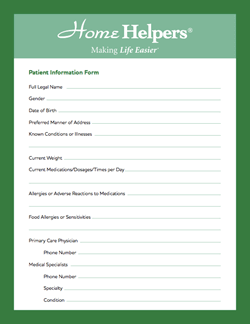We’ve talked and written quite a bit about the isolation and stress of day-to-day caregiving. But other significant stressors are unexpected. And for elderly people, unfortunately, those sudden interruptions sometimes include a trip to the hospital.
Going to the hospital is never a pleasant experience, but for a caregiver, there are the added complications of being responsible for two people, often coming from two different directions and for an undetermined length of time.
According to the National Center for Health Statistics, a part of the Centers for Disease Control (CDC), more than one in seven Americans age 65 or older will need to spend at least one night in the hospital each year. Some of these hospital stays are planned in advance, but many are not. That’s why it’s important for us as caregivers to think ahead.
Pack Your Go-Bag Now
Preparation and teamwork are the keys in all aspects of caregiving. That’s why many families benefit from a simple act of preparation called the ready bag.
The ready bag (or go-bag) is a small backpack or similar bag (we recommend one that closes securely) prepared in advance for both the caregiver and the care recipient. This not only simplifies the process of getting out the door, it ensures that both of you will have what you need to keep confusion to a minimum.
Ready Bag Contents
Some of the contents are naturally a matter of personal preference and how much you can comfortably carry. Here are a few suggestions for your loved one’s ready bag from our experts in senior home care.
Patient Fact Sheet
Prepare a fact sheet that you can share with healthcare professionals to provide the basic information they’ll need to evaluate and treat your loved one. This fact sheet should include:
- His or her full legal name. • Ideally, it will match insurance and other documents, so be consistent in the use of initials, courtesy titles and suffixes like Jr. or Sr. • Preferred name, like William or Bill, Mr. Johnson, etc.
- List of any existing conditions or chronic illnesses.
- Current medications, including over-the-counter treatments, with dosages and schedule.
- Allergies or adverse reactions to any medications as well as food sensitivities. (Some treatments and diagnostic procedures can be affected by food allergies.)
- Regular healthcare providers (names and phone numbers), including the primary care physician and any specialists, along with the specific conditions each specialist is addressing.
- Special dietary considerations, including low sodium, diabetic, halal, kosher, vegetarian.
- Communication issues. Ask yourself whether the loved one often becomes confused easily, has a speech or hearing impairment, or is more comfortable speaking in a language other than English.
- Preferred faith tradition.
- Your information, including name, relationship and contact information, plus that of another trusted family member or friend. Be sure to include mobile numbers if these are not the primary contact numbers.
Printable Patient Information Form

Download and print a free, editable Patient Information form to keep in your ready bag.
DOWNLOAD
Copies of Important Documents
Other documents that may be needed are copies of:
- Insurance card (front and back, as authorization numbers often are on the reverse)
- Medicare/Medicaid card
- Medical power of attorney/Durable power of attorney
- Living Will, do-not-resuscitate order
- Organ donor affidavit if applicable
Medication, Toiletries, and Other Supplies
You also might consider some supplies that will make your loved one more comfortable if a trip to the emergency room turns into an inpatient admission. Keep in mind that you need only small quantities, replenishing them if necessary—you don’t want to have to carry an expedition-size bag for what may be a quick trip.
- Eyeglasses/contact lenses
- Denture cleaning supplies
- Hearing aid batteries
- A change of clothing: underwear, socks, tops, bottoms, slippers – the objective is comfort, not style
- Toiletries and personal care items including:
- Dry shampoo, a comb or hair brush
- Deodorant
- Hand lotion/moisturizer
- Hand/facial wipes
- Small bag for securing jewelry or other valuables
- A small amount of cash
- Comfort items like copies of family photos, prayer book, Bible, rosary, etc.
- Reading material
- A list of family and friends with phone numbers
In an upcoming installment, we’ll discuss a ready bag for the caregiver. Meanwhile, we’d like to know what’s in your ready bag, what we’ve missed and your suggestions or additions to the list we’ve started. Join the conversation on our Facebook page.
